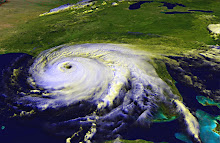Techlicious has a great article on gadgets you can use during a power outage. My favorite is the Eton BoostTurbine 2000mAh Portable Backup Battery Pack-Charger (pictured, left). This one's about $60 at Amazon, but the company makes some other portable, self-powered charging units that are cheaper. I don't have a smartphone, but I can make calls, send text messages, and tweet from my old-fashioned flip phone. That gives me several ways to keep in touch with family and friends, even if the power's out, the phone lines are down, and the internet is dead.
The Tampa Bay Times profiles several kinds of storm gear, including some home water purifiers. Right after Hurricane Ivan, we were getting just a trickle of water, at best, until the company repaired damaged pipes and equipment. You should have enough bottled water for your family and pets for at least three days, but if repairs take longer than that, or if you want to be sure you have clean water for washing up, a purification device provides a simple worry-free option. You can also use water purification additives
Remember, some of the most important items in your disaster kit are gadgets, and they need to be powered by batteries, solar, or crank - not electricity.
- Portable Radio
- Flashlight
- Can Opener
- Hand Tools



